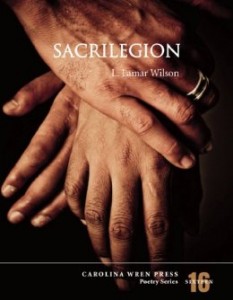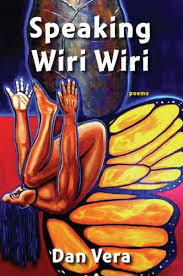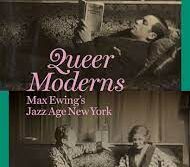 Sacrilegion
Sacrilegion
by L. Lamar Wilson
Carolina Wren Press. 88 pages, $17.95
Speaking Wiri Wiri
by Dan Vera
Red Hen Press. 80 pages, $16.95
THE WORLD of poetry for gay poets is increasingly a space where poets of diverse ethnicities are publishing stirring work. In the realm of gay male poets, some of the most exciting new or younger writers fall into this category: Jericho Brown, Rick Barot, Eduardo Corral, to name just three. Up-and-comers include Saeed Jones and Ocean Vuong. Two new books, both award winners, now widen that field of representation, however differently they approach race, culture, gay experience, and poetics.
Sacrilegion by L. Lamar Wilson, an African-American poet, won the 2012 Caroline Wren Press Poetry Series Prize. As his title suggests, Wilson’s themes often wrestle with religion. The title in fact appears in one of the book’s strongest poems, “Resurrection Sunday,” in which a speaker struggles to make sense of two very different scenes: one pornographic, a black man performing autofellatio; and the other horrific and historic, a black man hanged after being accused of raping a white woman in 1934. In both scenes, the men have had their penises forced into their mouths, one through sexual exploitation, the other through brutal, deadly force. Near the end of the poem the speaker addresses Jesus (“that other hanged man”), asking: “if a man is black and his manhood is forced/ into his own mouth by another man/ who’s as afraid of the power he holds/ but is pale enough to hold the camera/ or the noose how much of a man isn’t he?” While the black body is powerfully explored in these poems, it’s important that Wilson explores not only its beauty but also the violence done to it. While religion is never too far away in these poems, Wilson also addresses AIDS, politics (including Barack Obama’s presidency), the love of his mother and other women in his life, growing up different, and of course the powerful act of two black men loving one another. Wilson follows an important tradition to which this first book is a significant contribution.
Speaking Wiri Wiri, Dan Vera’s second book, won the 2012 Letras Latinas/ Red Hen Poetry Prize. Vera, born to Cuban parents in South Texas, is the editor of the gay spirituality journal White Crane. Vera’s title refers to a phrase invented by his father meaning “gibberish.” It is language—how it shapes us, how it creates contested space, and how it can link or divide us—that Vera explores in this book. His take on language can be reduced to two lines from the book’s title poem: “The language holds us together” and “The language pulls us apart.” It’s a worldview pointedly informed by both his heritage and the geography of his childhood. Vera clearly draws on the groundbreaking work of lesbian poet-theorist Gloria Anzaldua, whose words serve as an epigraph to one of the book’s sections. The book, however, is not simply an exploration of the connections between culture and language. There are many poems that poignantly recall family memories, including stories about his family’s exodus from Cuba. Many poems are unapologetically political in their messages—for immigration reform, for greater representation in the arts and culture, and so on. One of the strongest poems is about the monarch butterfly, which the speaker compares to an ancient Mayan goddess: “Who can stop the insistence of butterflies/ who pass from one generation to the next/ through chrysalis and death/ the cyclical routes of migration/ that obeys a higher order/ that flutters over serpentine rivers/ and laughs at the false borders of men?”
Vera and Wilson could not be more different. Wilson’s poetry is lyrical, risky, and engages provocatively with the experiences of gay black men. Vera speaks less directly and less often about homosexuality, and his poems are often short statements about language, memorable family stories, brief lyrics celebrating culture and memory. Still, at the heart of his poetry is a political ethos that is also never far from Wilson’s Sacrilegion. Both have important messages of resistance to the dominant culture; both should be read for what they can tell us about gay experience as integral to one’s identity and peripheral to it at the same time.




